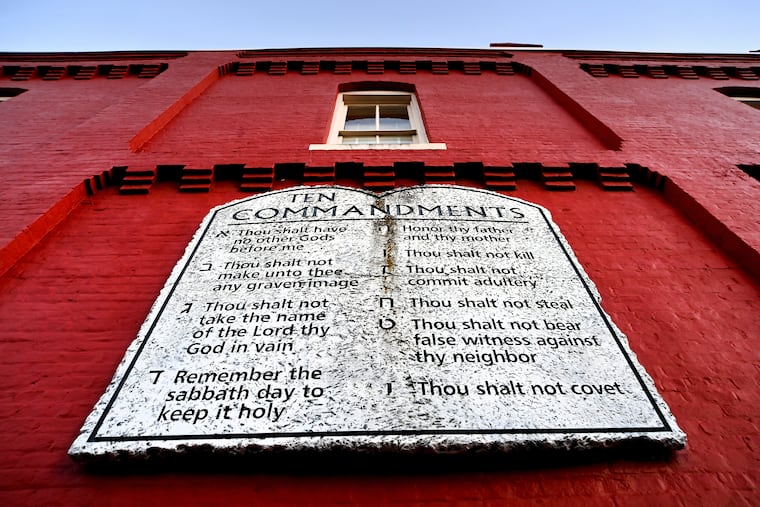Conservatives say liberals took religion out of schools. Truth is, it was never there to begin with.
Supporters of a Louisiana law that requires schools to display the Ten Commandments argue they were part of public education for centuries. But saying so would actually break the ninth one.

Once upon a time, public schools respected religion. They taught the Bible and posted the Ten Commandments. Then big bad liberals came along and took God out of the schools. And the rest, as they say, is history.
That’s what right-wingers want you to think, but they’re wrong. In earlier eras, religious instruction wasn’t nearly as common as they say. And when it did happen, it was promoted by political liberals as well as conservatives.
You’re unlikely to hear that from Republicans in Louisiana — who recently pushed through a law requiring the posting of the Ten Commandments in all classrooms — or in Oklahoma, where the GOP superintendent of education ordered schools to teach the Bible in grades five through 12. They’ve got their story, and they’re sticking to it.
According to the Louisiana measure, the Ten Commandments “were a prominent part of American public education for more than three centuries.” No, they weren’t.
True, as the law notes, the Ten Commandments were included in the New England Primer and McGuffey’s Reader in the colonial period and in the 1800s. But James Madison never claimed that “the whole future of our new nation” rests upon “the capacity of each of ourselves to govern ourselves according to the principles of the Ten Commandments,” as the measure also says.
According to the editors of Madison’s papers, there’s no record of him making that statement. It’s a hoax, which Louisiana has now enshrined into law.
And in 1927, a poll by the Methodist Episcopal Church showed that most Americans couldn’t name more than five of the commandments; the only one people identified consistently was the prohibition on adultery. What they knew came less from schools — which had long abandoned McGuffey’s Reader — than from pop-culture adaptations like Cecil B. DeMille’s 1923 blockbuster film, The Ten Commandments.
DeMille released a glitzy new version of the movie in the 1950s, which also witnessed the first broadscale efforts to require the posting of the Ten Commandments in American classrooms. If the commandments had been such a longtime feature of schools, as the Louisiana law claims, we wouldn’t have needed mandates to display them 70 years ago.
Ditto for Bible reading, which was hardly the ubiquitous practice conservatives imagine. Responding to an 1896 questionnaire, Nevada’s school superintendent wrote that “there is not one school in the State where the Bible is read.” Of 26 school districts replying to the survey in California, 19 reported no Bible reading.
In the 1950s, advocates said that religious teaching would help distinguish America from the Soviet Union and ‘Godless Communism.’
School districts stepped up Bible instruction in the 1950s, just as they did with the posting of the Ten Commandments. In the midst of the Cold War, advocates said that religious teaching would help distinguish America from the Soviet Union and “Godless Communism.” During these same years, a similar rationale inspired Congress to add “In God We Trust” to our currency and “Under God” to the Pledge of Allegiance.
But some citizens supported religious instruction as a way of fighting injustice at home, not just threats from abroad. That’s why African Americans lined up to watch DeMille’s The Ten Commandments, which depicted Moses liberating Jews from slavery in Egypt. The film is the “Voice of the Minorities trying to be heard,” one Black observer wrote. “Take your family so that the story of the struggle will never grow dim.”
In segregated Black schools, chapel services reminded students about the Bible’s message of freedom for all. Likewise, white civil rights supporters said that lessons from Scripture would help liberate young people from “the mental stockades of racial injustice,” as a North Carolina Bible teacher wrote.
This coalition fell apart in the 1960s, when the U.S. Supreme Court barred school-sponsored prayer and Bible reading. Fearful of eroding the authority of the court on matters like voting rights and housing discrimination, liberals retreated from religion in schools.
That ceded the issue to conservatives, who have been braying for the Ten Commandments and Bible reading ever since. To get around obvious constitutional objections, Republican advocates for the Louisiana and Oklahoma measures have gamely argued that their efforts have a secular purpose — to teach the role of these texts in American history — rather than a religious one.
Ironically, the measures distort that same history. And their true purpose was more accurately captured by the GOP’s putative presidential nominee, Donald Trump. “I LOVE THE TEN COMMANDMENTS IN PUBLIC SCHOOLS,” Trump tweeted, in support of the Louisiana law. “THIS MAY BE, IN FACT, THE FIRST MAJOR STEP IN THE REVIVAL OF RELIGION, WHICH IS DESPERATELY NEEDED IN OUR COUNTRY. BRING BACK TTC!”
Several parents have already sued to block the Louisiana measure on exactly those grounds: It promotes a distinct religion, in a nation that’s not supposed to establish one. Although the Supreme Court struck down a similar law in Kentucky in 1980, the current court has signaled greater support for religious expression in the public sphere. Instead of creating ironclad rules, the court says it will follow “history and tradition.”
But religious instruction is not as traditional as many of us suppose. Now is the time to remember that history, rather than reinventing a past we never had. That’s the only way to create a more just and fair future for all Americans, no matter what faith they might practice.
Jonathan Zimmerman teaches education and history at the University of Pennsylvania. He is the author of “Whose America?: Culture Wars in the Public Schools” and eight other books.